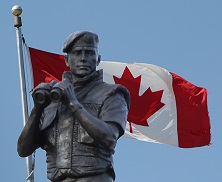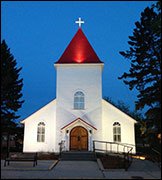True and Fascinating Canadian History
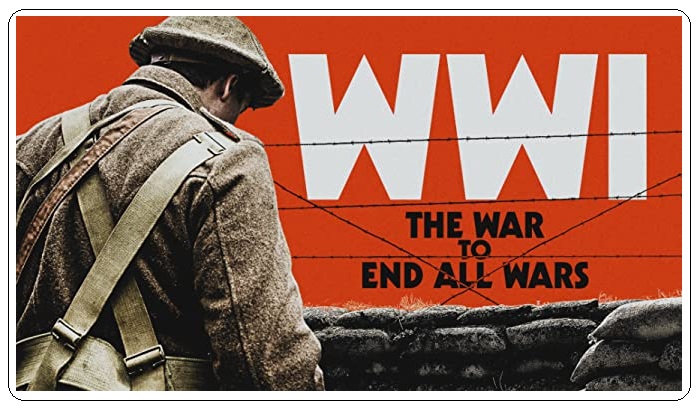
Vet of the Month: January 2014
O.147, Deputy Commissioner George Leslie Jennings
RCMP Veterans Vancouver, BC
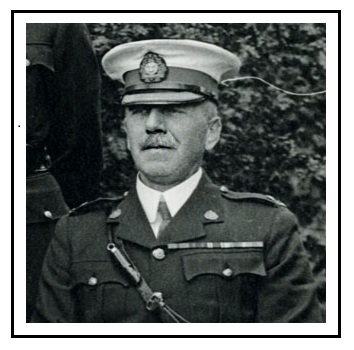
George Leslie Jennings not only made significant contributions to the RNWMP but he also held key posts whereby he oversaw major developments of the early Force.
G. L. Jennings was born at Toronto, ON on May 3rd 1875 as the son of Robert Cummings Jennings. He graduated from Woodstock College and then attended Canadian Business College in Hamilton ON.
Upon graduating, he commenced a banking career, but he sought a more active and adventurous career, so he applied for and received a Commission as a new Lieutenant in the 48th Highlanders in Toronto. Later, he transferred to the 38th Haldimand Rifles.
When the Canadian government agreed to send troops to the Boer War in South Africa, George Jennings sought and received a 'leave of absence' as a Trooper in the 2nd Canadian Mounted Rifles. In 1902, when the War ended, he returned to Canada and received a Commission as a Captain in the 90th Regiment in Winnipeg, MB.
He was attracted to the Royal Northwest Mounted Police (RNWMP), so he applied and was accepted into the Force on August 1st, 1906. Upon being sworn in, George received a Commission to the rank of Inspector. He was assigned Officer Number O.147.
After his orientation training at 'Depot' Barracks, Jennings was transferred to many locations before the commencement of World War I: Wood Mountain, Peace River District, Herschel Island, Regina and Edmonton.
In July 1911, Jennings was selected a member of the RNWMP Contingent sent to attend the Coronation of His Majesty King George V in London England. It was in September of 1911 that George married Miss Jean Gladys Bowen Perry - daughter of RNWMP Commissioner Bowen Perry.
After the outbreak of World War I, George Jennings was appointed as the Registrar of Alien Enemies for the Northern portion of the Alberta. Under the Canadian War Measures Act, all German and Austrian immigrants living in Canada had to register their location an movements.
On April 6, 1918, the Canadian government announced approval for the Force to commence recruiting for a Cavalry Draft which would consist of Force members mainly recruited from Western Canada. The original intend was to send the RNWMP as a component of the Canadian Expeditionary Force and to fight on the western front.
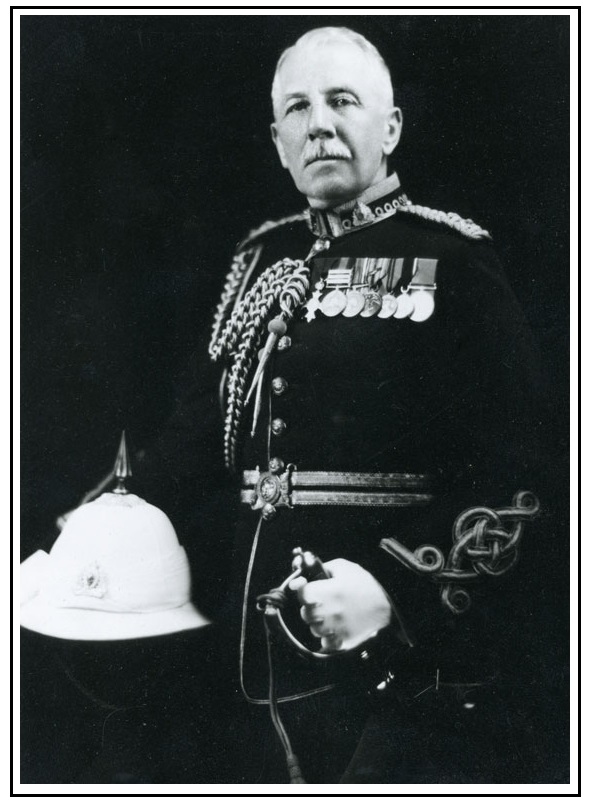
For this Cavalry Draft, Inspector Jennings was appointed to the military rank of Major and the Draft's Officer Commanding. He role consistedof Recruiting and the Selection process. Based on recruiting advertisements in newspapers, the recruiting drive was closed on May 13, 1918 with 726 applicants consisting of 12 RNWMP Officers; 81 RNWMP NCO's, 150 Constables and 495 new recruits.
The Cavalry Draft was organized into four Squadrons and their preliminary training took place at 'Depot' in Regina, SK. Each Draft member were sworn into the Canadian Expeditionary Forces. On May 30, 1918, the Cavalry Draft departed Regina on two separate CPR cars bound for Montreal then to Halifax, NS and finally on to Shorncliffe, England.
At the Canadian Force's Base at Shorncliffe, the Cavalry Draft were dispersed into three deployment groups: Royal Canadian Dragoons; 1st Canadian Tank Battalion and the Canadian Light Horse. The majority of the Force members went to the Canadian Light Horse and were deployed to France, Flanders and as part of the Occupation Force in Germany after the signing of the Armistice.
The Squadron remained in Europe after the Armistice which came into effect on November 1918. With labour unrest and strikes occurring in western Canada, the Canadian government was anxious for the ex-RNWMP members to return to Canada. Steps were undertaken to expedite the swift return of all ex-RNWMP members serving overseas.
Major Jennings was tasked to coordinate the gathering together of ex-RNWMP members who were in occupied Germany, Belgium and in England. The delay in the arrival of the ex-RNWMP members resulted in three separate Contingents returning to Canada then catching a train to Regina. Upon arriving in Regina, the ex-RNWMP members were demobilized from the Canadian Expeditionary Force and then re-engaged back into the Force.
Major Jennings returned with the last Contingent which consisted of over 100 Troopers. With the outbreak of the Winnipeg General Strike in May 1919, Major Jennings received orders to detrain at Winnipeg, MB where he was demobilized then re-engaged into the Force.
Winnipeg General Strike: June 21, 1919 - Two troops of RNWMP members regrouped and turned north. Believing that three dismounted men might be killed, an order was given to draw revolvers. The RNWMP turning left down William Street towards City Hall. A warning volley was fired over the heads of the gathering. When this failed to have effect, a second volley was fired low into the crowd which then began to disperse.
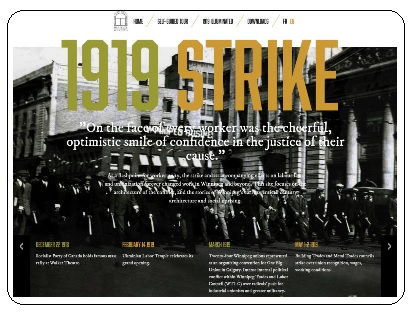
With the confrontations escalating in Winnipeg, it was Inspector Jennings who was In Command of the Mounted Troops who received his instructions from Superintendent Starnes (Officer Commanding in the District). Force members remained in Winnipeg and were deployed until the situation returned quiet.
On February 1, 1920, George Jennings was promoted to the rank of Superintendent and was placed in command of "G" Division. Several years later, he was transferred to Prince Albert, SK. In May 1928, he was transferred to 'O' Division in Toronto, ON and remained there until February 1932.
With the Force taking over the provincial policing duties in many provinces (Alberta, Manitoba, New Brunswick, Prince Edward Island and Nova Scotia) in 1932, George Jennings was transferred to Headquarters, Ottawa as the new Director of Criminal Investigations. With this transfer, he was promoted to Assistant Commissioner on March 1, 1932.
On April 23, 1937, he was promoted again to the rank of Deputy Commissioner as the Second in Command of the Force.
George Jennings retired from the Force on August 1, 1938. Thereafter, he and his wife moved to Vancouver, BC.
I wish to sincerely thank my friend Sheldon Boles for his January, 2014 Vet of the Month contribution. I also acknowledge the photos in Sheldon's piece from the RCMP Historical Section, 'Depot' Division. Thank you.
Reporting from Fort Healy,J. J. Healy
January 23, 2014
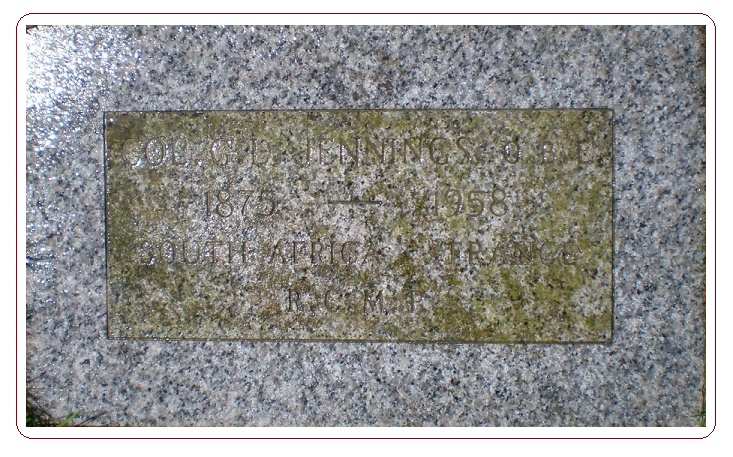
He was laid to rest at the Capilano View Cemetery in North Vancouver, BC

